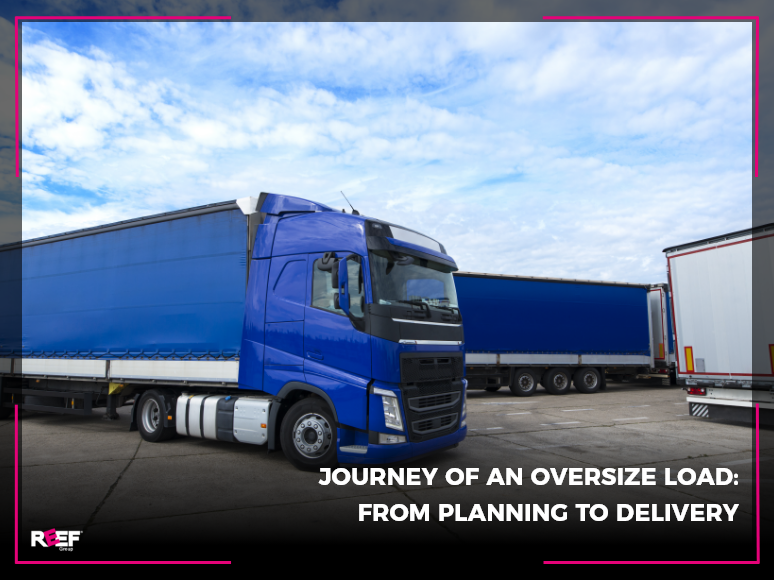Achieving Efficiency: The Importance of Route Optimisation in Transport Companies

Transportation Security: best practices for transport companies
May 15, 2023
How to Prepare Your Goods for Container Shipping: Tips from a Top Transport Company
July 27, 2023In a world where margins are tight, and it is important to increase efficiency in every single aspect of a business, the transportation and logistics industry is all too aware of the need to optimise operations wherever it can. But what are the factors affecting route planning and the actual physical transportation aspect of the business? In creating this article, we spoke with the most experienced members of the team here at Reef Group and collected their insights and tips to improve route optimisation for a logistics company.
They were in unanimous agreement that route optimisation for a logistics company was among the most crucial elements in its success and that the following factors played essential roles:
- Distance
- Traffic conditions
- Delivery time windows
- Estimated vs actual travel time
- Fuel consumption
- Operational expenses
- Unexpected occurences (accidents, acts of nature etc…)
We will explore the importance and benefits of some of those factors and analyse how advanced software and other innovative solutions can help streamline procedures, lower costs, and deliver efficient outcomes.
Route optimisation for a logistics company

At its most basic level, route planning is simply the process of determining the most effective, practical way to travel between two or more locations. Its simplicity is belied by straightforward. Contributing factors include:
Distance
One of the only factors which cannot be altered in any way is the physical distance between two points, but that is not to say the subject is a closed one. There are steps which can be taken to optimise routes and combine deliveries if possible.
We have all looked at flights online and been bewildered at the distances we might go out of our way in the exact opposite direction if we choose inefficient ones. The same has undoubtedly been true in the transportation industry in the past, as vehicles made individual journeys which could easily have been paired with others and optimised with enough information and planning. But times are certainly changing, not least through the use of:
Technology
Modern technological developments have revolutionised many aspects of our lives and transformed huge areas of business and industry. And this applies equally to logistics. Computer-assisted route planning has perhaps changed the industry more than any other advancement, allowing for:
- Reduced fuel consumption and costs
- Efficient routing
- Traffic/congestion avoidance
- Reduced vehicle wear and tear (by choosing roads with better surface quality)
The importance of GPS
Route optimisation for a logistics company relies heavily on GPS, (Global Positioning Systems) and it is fair to say the industry would be lost without it. It is now perfectly feasible and common practice for companies to track all of their vehicles 24/7 and when combined with the analysis of other external elements, this makes for a very powerful tool.
This is not done merely to monitor their whereabouts and prevent theft or employee misuse, although those are contributing factors to its value. Data from GPS movements can be measured alongside those from a telematics system which gives feedback on every aspect of the vehicle during its journey, including:
- Speed
- Fuel usage
- Engine diagnotics
It is even possible to include driver statistics into the equation of employees through monitoring equipment and checking for inefficient driving styles, tiredness, and undue stress.
Monitoring vehicle performance
The systems gathering and analysing information about the vehicles as they move, can assess a range of characteristics and lead to a constant evolution of efficiency improvements. For example, the telematics analysis might reveal fuel efficiency is much improved at a certain constant speed and allow the company to limit their vehicles in certain areas, whether with practical devices or by instructing drivers to maintain that speed whenever possible.
Driver behaviour, style, and performance can also be closely monitored, allowing companies to determine the optimum number of rest breaks and their durations. Teaching drivers to control their vehicles in such a manner that fuel consumption is reduced can create huge savings. All possibilities can be considered, using the plethora of data the system receives constantly, including issues affecting:
- Vehicle capacities and limitations
- Safety
- Load tolerances and optimisation
- Accurate time window/delivery management
- Real-time communication updates
Real-time route adjustments
The powerful combination of GPS and telematics data allows companies to adjust vehicle routes in real-time as events unfold ahead or new information leads to alternative, more efficient options. Organisations can dynamically respond to factors including, but not limited to:
- Traffic conditions
- Road closures
- Accidents or unforeseen events
Being able to effectively see what is up ahead is a game-changing innovation for the industry, no longer forced to rely on accurate radio traffic/weather reports.
Fleet management
Using all this advanced information, companies can now predict optimum times to deal with issues like vehicle maintenance and excessive fuel consumption. It is also a superb way to monitor the behaviour of drivers and ensure they are abiding by the rules and regulations at all times. This way, the risk of accidents and incidents caused by driver error or misbehaviour can be somewhat mitigated.
The costs associated with damaged vehicles, injured workers, and increased insurance premiums are not to be underestimated. The bottom line for any logistics company is a tight one requiring constant assessment and careful protection in order for it to succeed in such a competitive industry.
Improved customer service
Timely, dependable deliveries can only please clients and their overall customer experience can be improved by the accuracy of predicted arrival times, optimised deliveries, and enhanced communication capabilities.
Environmental benefits
There is no denying transportation plays its part in the pressure we place on our precious environment, and optimised routes and other processes go some way towards addressing that. Reduced fuel use and improved vehicle emissions are a fine place to start but there is still much work to be done.
Conclusion
So, with a deeper look, we can see route planning for a logistics company clearly involves a great deal of focus, effort, and high-tech products and software. The process is anything but simple, however, its goal is a worthwhile one that becomes ever more achievable with time. By leaving no stone unturned, the consideration of myriad factors can lead to significant improvements in efficiency. Something future generations will hopefully build upon in their battle to halt and even reverse the potentially catastrophic effects of climate change.
Contact us
If you would like to learn more about the services of the premier transport company in Perth, please contact Reef Group with any questions or comments. Our dedicated, professional team will openly discuss any aspect of transportation and logistics and start the process of tailor-making a quote for your own requirements.


